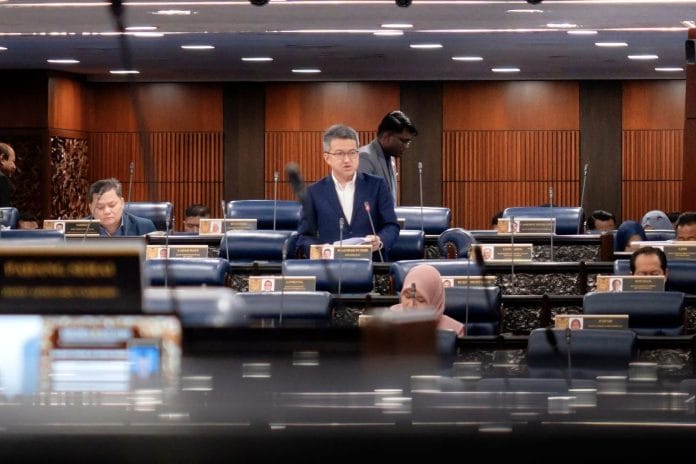The Ministry of Investment, Trade and Industry (MITI) has identified 10 main action plans to be implemented throughout the year, covering Mission one through Mission four under NIMP 2030.
The New Industrial Master Plan 2030 (NIMP 2030) — the fourth edition of the master plan designed to enhance the capabilities of the country’s industrial sector to be more sustainable and competitive globally — was launched in September 2023, and falls under the purview of MITI which has coordinated the implementation of action plans as outlined under NIMP 2030.
To a question raised by Dato’ Seri Dr. Ahmad Samsuri Mokhtar [KEMAMAN] in the Dewan Rakyat today on the extent to which the NIMP 2030 has successfully implemented the four missions set since its launch, namely in advancing the economy, increasing productivity, addressing climate change, and ensuring supply chain security, MITI Deputy Minister Liew Chin Tong said for the year 2024, in respect of Mission 1, which aims to advance economic complexity, the National Semiconductor Strategy (NSS) was launched in May 2024 to develop the entire semiconductor and electronics industry ecosystem and support action plans to establish local key players in integrated circuit (IC) design, as well as to attract foreign investors to develop wafer fabrication in Malaysia.
Additionally, he said, the Chemical Industry Roadmap was launched in August 2023 to support the development of specific chemical sub-sectors within manufacturing industries.
“Under Mission 2 of NIMP 2030, the readiness assessment programme under the Industry4WRD policy is being enhanced in efforts to achieve the target of establishing 3,000 smart factories by 2030. Currently, MITI is finalising the TechUp programme in collaboration with SIRIM, FMM, and financial institutions to implement these action plans,” Liew said.
He added, for Mission 3 of NIMP 2030, aimed at achieving Net Zero, the iESG Framework for industrial players was launched in October 2023, and transition programmes are actively being implemented to assist industries in providing at least sustainability reporting during the just transition period as a first step towards enhancing competitiveness by meeting ESG aspects.
Additionally, in support of action plans to develop decarbonisation pathways at the sectoral level, a study on this matter is being conducted by MITI and is targeted for completion by November 2024. Furthermore, activities to develop Carbon Capture, Utilisation and Storage (CCUS) as a new economic source are being implemented involving various Ministries and Agencies.
MITI has also finalised the Circular Economy Economic Framework for the Manufacturing Sector to support the transition to more sustainable manufacturing processes by promoting optimal resource use. This framework is expected to be launched in the third quarter of 2024, Liew told the August House today.
Liew explained, to achieve the vision and goals of NIMP 2030, through a mission-based approach, NIMP 2030 sets out four (4) main missions, 21 strategies, 62 action plans, and nine (9) mission-based projects (MBPs) as catalyst projects. MBPs are existing projects in the private sector that will drive he development of the manufacturing sector in line with the goals of NIMP 2030.
The four (4) missions of NIMP 2030 are as follows:
i. Mission 1: Advancing economic complexity
ii. Mission 2: Enhancing technology to build a digitally vibrant nation
iii. Mission 3: Efforts towards Net Zero
iv. Mission 4: Ensuring economic security and inclusivity
Through the Steering Committee led by the Ministry of Economy and comprising various Ministries and Agencies, several Working Groups have been established to examine all aspects involved in the comprehensive development of the CCUS ecosystem. This includes legal, financial, industrial development, investment, technological, environmental aspects, and others. As previously announced by the Government, the CCUS Bill is targeted to be tabled in Parliament by late 2024.
Furthermore, Terengganu has been identified as a strategic state for the development of the CCUS sector in Malaysia, as outlined in the NIMP 2030 document. Through discussions conducted by MITI with Petronas as the Mission-based Champion for the CCUS sector, industrial clusters in Kerteh and Kemaman were found to have significant potential to utilise CCUS technology, particularly for decarbonizing difficult-to decarbonise sectors such as iron and steel, cement, and petrochemical industries operating in Terengganu.
This is due to the location of these industrial clusters within the proposed East CCUS Hub centred in Kerteh.
“To support the action plan for Mission 4, which aims to ensure economic security and inclusivity, MITI is in the final stages of completing supply chain mapping for six (6) key sectors: pharmaceuticals, medical devices, electrical and electronics, automotive, food processing, and personal protective equipment, in efforts to establish sustainable and resilient supply chains.
“NIMP 2030 adopts a whole-of-nation approach that requires strong and integrated cooperation between the public and private sectors. I am confident that this approach can be effectively implemented to ensure that the objectives of NIMP 2030 are achieved and ultimately benefit the Malaysian economy,” Liew said.









